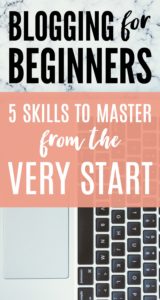For thousands of people the world over (myself included), blogging is no longer just a hobby, but a way to make a living and create a life on their own terms.
 As a beginner blogger, however, it’s all too easy to overlook important skills that will help your site grow so that you can begin to earn money from it.
As a beginner blogger, however, it’s all too easy to overlook important skills that will help your site grow so that you can begin to earn money from it.
There seem to be a million things to learn–how on earth do you know where to begin?
When I started blogging three years ago, I had no idea what I was doing. With more experience under my belt, it’s easy to see where I should have been spending more time and what skills I should have been learning to increase my traffic and get my name out there faster.
This post is for all the beginner bloggers (or the ones who’ve been at it for awhile who may have neglected these skills–no shame, I was in the very same boat until recently) who want to run their blog as a business and want to do things the RIGHT way, right from the start.
Do NOT overlook these skills when starting out as a blogger if you want to see steady growth, gain influence, and turn your blog into a money generating machine.
Learn how to start your own blog or dive right in and buy a domain.
Master these 5 skills from the start if you want to #makemoneyblogging Click To TweetBlogging for Beginners: Master These 5 Skills
Skill #1: Writing for the Web

Newsflash! Writing for the web is an entirely different beast than writing for other mediums.
The most important thing for beginning bloggers to keep in mind is that web users prefer to consume information in short bursts.
For example, web consumers like short paragraphs rather than rambling ones.
They love lists and easy-to-digest formatting that allows them to spend more time scrolling than scanning left to right. This is precisely why sites like Buzzfeed are so wildly popular.
They also like easy-to-understand words rather than fancy vernacular (and so do search engines). A friendly, conversational tone is key.
Not only that, but mobile web use is on the rise; 56% of consumer web traffic to top US websites comes from mobile devices, and the same holds true for blogs.
As of February 2017, The Sweetest Way’s traffic breakdown is 56% mobile, 34% desktop, and 10% tablet.
This demands that websites be optimized for mobile reading, and that includes shorter paragraphs and plenty of line breaks.
Keep these basic rules in mind when writing for the web:
- Use a conversational tone, as if you’re chatting with a good friend
- Write in an active voice (Say “They learned” instead of “They were learning“)
- Make use of headings and highlight important points with bolding and italics
- Write short paragraphs
- Use lists instead of paragraphs when possible
- Be concise
Read more useful tips for writing for the web.
When writing for the web, use short paragraphs and concise wording. #beginnerblogging Click To TweetSkill #2: Basics of HTML

When starting a blog, you likely won’t need many coding skills, especially if you’re blogging on a platform like WordPress.org or Squarespace.
However, understanding the basics of HTML (Hypertext Markup Language–the standardized language that tells a web browser how to display a web page) will be invaluable to you as you navigate your new blogging journey.
You don’t want to rely on a developer every time basic coding is required, and you really can get by without going into too much depth.
For basic HTML and CSS tutorials, you can head to W3Schools.com.
However, if you’re interested in a more structured learning experience, I suggest enrolling in a self-paced learning program like Treehouse that teaches you how to code through interactive exercises.
Every beginner blogger should learn the basics of HTML and CSS #bloggingtips Click To TweetSkill #3: Search Engine Optimization

In order for your blog to be discovered by search engines like Google and Bing, there are certain things you must do for each individual post and for your website as a whole.
This is where Search Engine Optimization (SEO) comes in.
Writing posts that you love and enjoy writing is certainly important; however, neglecting to optimize any of your blog posts for search engines will cause you major headaches if you plan to blog for profit.
It’s never a good idea to rely solely on social media to drive traffic to your blog; SEO is a reliable long-term strategy.
Take it from someone who blogged without a plan for nearly two years! You don’t want to make the same mistake I did.
Follow these basic steps to create blog posts that will perform well in searches:
- Do proper keyword research for every new post using Google’s Keyword Planner*
- Choose long-tail keywords that have low competition
- Install the Yoast SEO Plugin and use it as a guide to help optimize each post
- Learn the other ranking factors and tailor your blog posts accordingly
*If you have never created a Google Adwords account before, be absolutely sure to click the link that says “Skip Guided Setup” when it asks you to create your first ad campaign.
Keep in mind that keywords are only one small portion of proper SEO; there are many other things that affect your search traffic, like page loading times, internal and external links, and so much more.
If you’re overwhelmed by the wealth of information to learn, I highly recommend taking a course on SEO before creating any more blog posts. You’ll be glad you did.
My SEO course recommendation: How I Hit #1 on Google: The 2017 Complete SEO Course
Starting a blog? Learn proper SEO right from the start #beginnerblogging Click To TweetSkill #4: Pinterest

Social media in all of its various forms (Facebook, Twitter, Instagram, Pinterest, Snapchat, etc) is essentially free marketing for bloggers, and when used correctly, it can prove extremely powerful.
It will quickly become obvious to the beginner blogger that Pinterest is unlike any other social media platform for several reasons:
- It’s used as a search engine rather than for socializing
- Pinterest users are more likely to make purchases than users from other platforms
- You don’t need a huge following to see huge traffic
Pinterest is a visual discovery platform that helps bloggers drive tens and even hundreds of thousands of site visits every month.
Yes, Pinterest delivers ENORMOUS traffic-driving potential, but you have to know what you’re doing. Pinning without a strategy is a surefire path to frustration.
Implementing these Pinterest best practices from the very beginning will get you off to a good start.
For Pinterest success, follow these basic guidelines:
- Create beautiful “pinnable images” that are taller than they are wide (735 px x 1102 px is fairly standard)
- Use stock photos if your own photography needs work
- Use descriptive text overlays that entice people to click
- Avoid repinning spammy links
- Create content with Pinterest in mind–lists and “How To” posts do especially well
- Automate your pinning with a third-party app like Boardbooster
Like every other social media platform out there, Pinterest changes constantly, making your strategy something of a moving target. I recommend keeping up-to-date with changes and learning as much as you can on an on-going basis.
Pinterest is a powerful (& free) marketing tool every #beginnerblogger should use Click To TweetSkill #5: Affiliate Marketing

If you’ve never heard of affiliate marketing before, this refers to promoting and selling other people’s products in exchange for a commission on every sale you generate.
Bloggers use trackable links to know when a customer has left their site to make a purchase and the affiliate partner (whether it’s a big brand like Amazon or a fellow blogger selling a digital product) pays them whatever commission rate they set forth in the terms–anywhere from 4-60% depending on the program.
Affiliate marketing is a great way for bloggers of all levels to earn an income and can even be largely passive after you’ve put in the initial work.
It helps to have an audience who trusts your opinion enough to purchase the things you recommend, however, which means it may not be in a beginner blogger’s best interest to promote affiliate products from day one.
This could come across as desperate or like you’re only in it for the money. The bloggers who use this tactic most successfully promote ONLY those products they use themselves and can personally vouch for.
Promoting anything and everything, on the other hand, is a good way to quickly lose your readers’ trust.
That said, it never hurts to learn affiliate marketing techniques from the very start so that by the time you are ready to use affiliate marketing as a monetization strategy, you’ll have a solid grasp on it.
Just like Pinterest, this is one of those things that will NOT work without a proper strategy.
Follow these tips for affiliate marketing success:
- Enroll in an affiliate marketing course so you can implement the right strategies from the beginning
- Stick to your niche–don’t promote products that don’t make sense or provide value to your audience
- Write product reviews or course reviews to target people who are already considering making a purchase
- Avoid putting all your eggs in one basket by diversifying the products you promote
My affiliate marketing course recommendation: Making Sense of Affiliate Marketing
Affiliate marketing is a great way for bloggers of all levels to #makemoneyonline Click To TweetThis post contains affiliate links; I may earn a small commission if you make a purchase, at no extra cost to you. Thank you for supporting The Sweetest Way.



